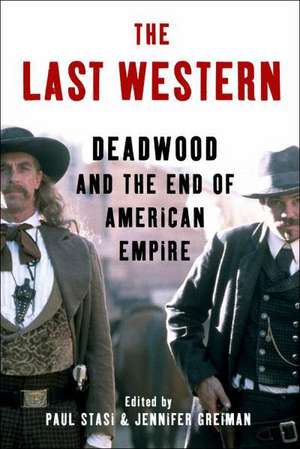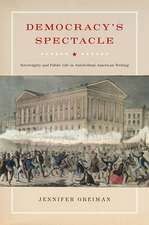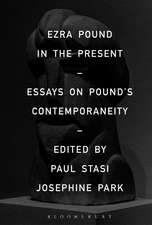The Last Western: Deadwood and the End of American Empire
Editat de Paul Stasi, Jennifer Greimanen Limba Engleză Hardback – 13 feb 2013
| Toate formatele și edițiile | Preț | Express |
|---|---|---|
| Paperback (1) | 238.22 lei 6-8 săpt. | |
| Bloomsbury Publishing – 13 feb 2013 | 238.22 lei 6-8 săpt. | |
| Hardback (1) | 773.39 lei 6-8 săpt. | |
| Bloomsbury Publishing – 13 feb 2013 | 773.39 lei 6-8 săpt. |
Preț: 773.39 lei
Preț vechi: 990.21 lei
-22% Nou
Puncte Express: 1160
Preț estimativ în valută:
148.09€ • 152.60$ • 124.27£
148.09€ • 152.60$ • 124.27£
Carte tipărită la comandă
Livrare economică 22 februarie-08 martie
Preluare comenzi: 021 569.72.76
Specificații
ISBN-13: 9781441164582
ISBN-10: 1441164588
Pagini: 224
Dimensiuni: 152 x 231 x 20 mm
Greutate: 0.5 kg
Ediția:New.
Editura: Bloomsbury Publishing
Colecția Bloomsbury Academic
Locul publicării:New York, United States
ISBN-10: 1441164588
Pagini: 224
Dimensiuni: 152 x 231 x 20 mm
Greutate: 0.5 kg
Ediția:New.
Editura: Bloomsbury Publishing
Colecția Bloomsbury Academic
Locul publicării:New York, United States
Caracteristici
Situates Deadwood in the context of both its nineteenth-centurysetting and its twenty-first-century audience.
Notă biografică
Jennifer Greiman is Associate Professor of English at the University at Albany, SUNY, US. She is the author of Democracy's Spectacle: Sovereignty and Public Life in Antebellum American Writing (Fordham 2010), as well as essays on Gustave de Beaumont, Herman Melville, and Edgar Allan Poe. Paul Stasi is Assistant Professor of English at the University at Albany, SUNY, US. He is the author of Modernism, Imperialism and the Historical Sense (2012), as well as essays on T.S. Eliot, Richard Flannagan, James Joyce, Ezra Pound and Jean Toomer.
Cuprins
Introduction: Deadwood and the Forms of Empire --Jennifer Greiman and Paul StasiPart I - No Law at all in Deadwood: Statelessness, Violence, and SovereigntyChapter 1: A Terrible Beauty? Deadwood, Frontier Rhetoric, and U.S. Hegemony in the Post-9/11 Era --Erik Altenbernd and Alex YoungChapter 2: Listen to the Thunder:' Deadwood and the Extraordinary Depiction of Ordinary Violence --Justin A. JoyceChapter 3: Vile Task: Founding and Democracy in Deadwood's Imperial Imagination --Ronald SchmidtPart II -Taking people's money: Agency, Identity and Political EconomyChapter 4: It's all f***ing amalgamation and capital, ain't it?: Deadwood, the Pinkertons, and the Closing of the Frontier -- Jeffrey Scraba and John David MilesChapter 5: The Gothic Frontier of Modernity: The 'Invisible Hand' of State-Formation in Deadwood --Julia M. WrightChapter 6: Securing the Color: The Racial Economy of Deadwood -- Daniel WordenPart III - A Sovereign F***ing Community: Sexuality and the Frontiers of the SocialChapter 7: The Return of the Father: Deadwood and the Contemporary Gender Politics of Complexity -- David GrevenChapter 8: The World is Less Than Perfect: Nontraditional Family Structures in Deadwood -- Paul ZinderChapter 9: Messages from Invisible Sources: Surveillance and the Public Sphere in Deadwood -- Mark Berrettini
Recenzii
The Last Western is laudable in its efforts to draw attention to Deadwood and its role in what has at times been called a new era of television. There are readings in this anthology which should be of interest for anyone working on Deadwood or television studies.
Scholars and students interested in Deadwood and HBO will find much that is useful, as will scholars interested in how television drama can articulate anxieties and concerns about contemporary issues via historical or generic forms. Summing Up: Highly recommended. General readers, undergraduate students, graduate students, and research faculty.
The collections handily meet the challenge that vexes much writing about film, an ephemeral genre in which retelling can overshadow reflection. One way the various essayists accomplish this is by recalling powerful scenes from Deadwood that form indelible tableaus . These essayists represent perspectives not only from literary studies but from political science, film studies, and history.
Anchored by the editors' incisive introduction, this timely volume goes a long way to redress the dearth of scholarship on one of the richest television dramas in recent years. One of the book's particular strengths--rare for an anthology of this nature--is its focus; from a variety of disciplinary perspectives, the contributors plumb the intersection of Deadwood's visual style, its treatment of genre, and its exploration of political economy at the formation and waning of the American empire. Several of the chapters will be required reading for my course on contemporary American television.
This wonderfully thought-provoking book invites the reader to "Go West!" And here, the journey West is also a journey in -- into the heart of the anxieties and desires that continue to shape contemporary experiences of American Empire.
By initially seating David Milch's Deadwood among the other significant HBO shows that interrogate American iconography and culture at the turn of this century, The Sopranos and The Wire, Stasi and Greiman have managed to produce a surprisingly cohesive examination of what they call "The Last Western" through a variety of academic voices and disciplines. What results is a useful volume of essays that at once consider a diversity of concerns in the show, political, social, and familial, while still supporting a central argument that this unfinished series may represent a new understanding of the limits of the Western in narrating American hopes and anxieties as well as providing an important acknowledgment that those same hopes and anxieties continue to haunt contemporary American life. This is a must have volume for those seeking to delve further into the significance of the all-too-short-lived series but also to those interested in understanding how popular media reflects and refracts the conflicts of a contemporary American experience.
Scholars and students interested in Deadwood and HBO will find much that is useful, as will scholars interested in how television drama can articulate anxieties and concerns about contemporary issues via historical or generic forms. Summing Up: Highly recommended. General readers, undergraduate students, graduate students, and research faculty.
The collections handily meet the challenge that vexes much writing about film, an ephemeral genre in which retelling can overshadow reflection. One way the various essayists accomplish this is by recalling powerful scenes from Deadwood that form indelible tableaus . These essayists represent perspectives not only from literary studies but from political science, film studies, and history.
Anchored by the editors' incisive introduction, this timely volume goes a long way to redress the dearth of scholarship on one of the richest television dramas in recent years. One of the book's particular strengths--rare for an anthology of this nature--is its focus; from a variety of disciplinary perspectives, the contributors plumb the intersection of Deadwood's visual style, its treatment of genre, and its exploration of political economy at the formation and waning of the American empire. Several of the chapters will be required reading for my course on contemporary American television.
This wonderfully thought-provoking book invites the reader to "Go West!" And here, the journey West is also a journey in -- into the heart of the anxieties and desires that continue to shape contemporary experiences of American Empire.
By initially seating David Milch's Deadwood among the other significant HBO shows that interrogate American iconography and culture at the turn of this century, The Sopranos and The Wire, Stasi and Greiman have managed to produce a surprisingly cohesive examination of what they call "The Last Western" through a variety of academic voices and disciplines. What results is a useful volume of essays that at once consider a diversity of concerns in the show, political, social, and familial, while still supporting a central argument that this unfinished series may represent a new understanding of the limits of the Western in narrating American hopes and anxieties as well as providing an important acknowledgment that those same hopes and anxieties continue to haunt contemporary American life. This is a must have volume for those seeking to delve further into the significance of the all-too-short-lived series but also to those interested in understanding how popular media reflects and refracts the conflicts of a contemporary American experience.
Descriere
This collection grounds contemporary anxieties about race and class, domesticity and American exceptionalism in its nineteenth-century setting through a close reading of the Deadwood series.















